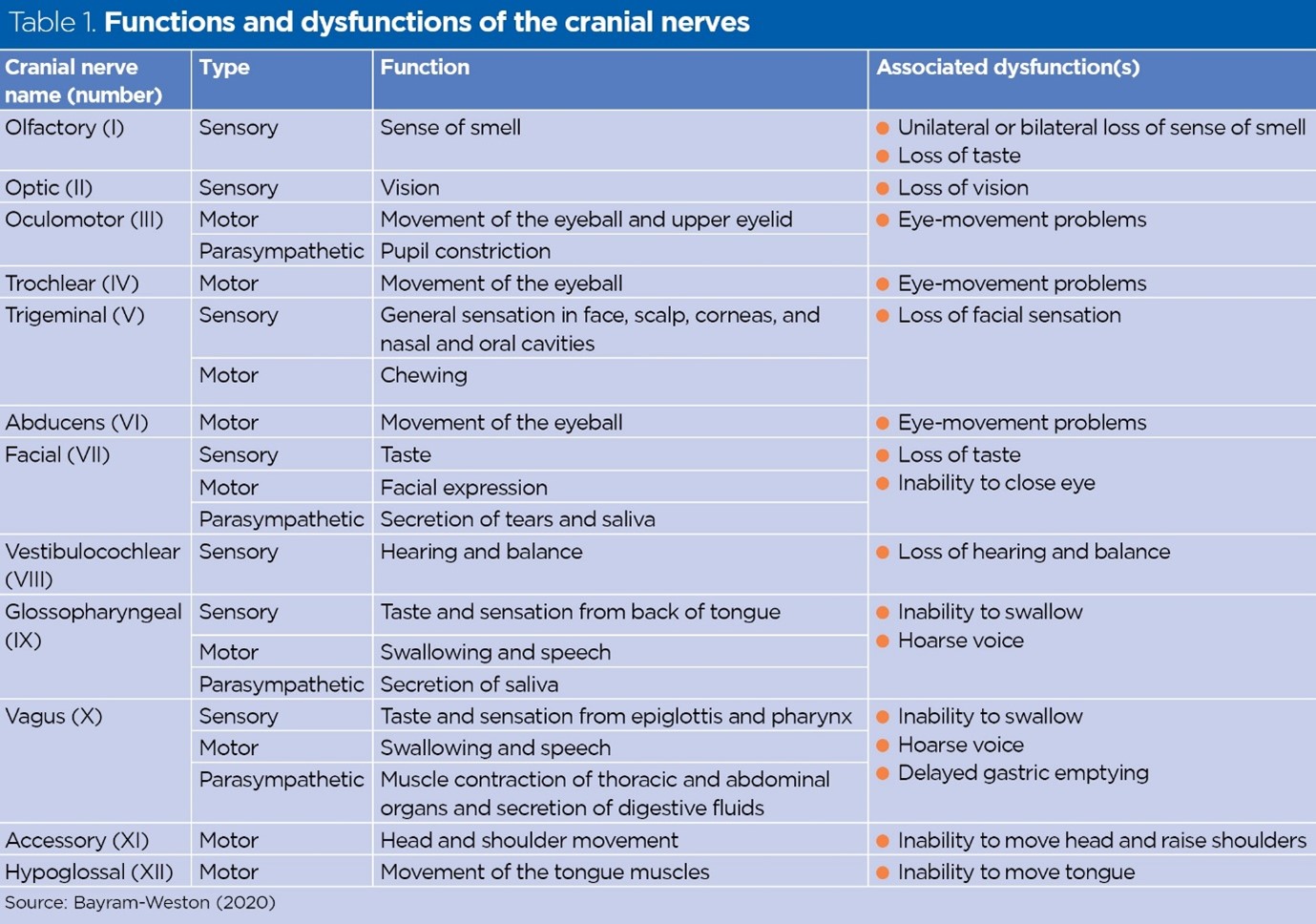A nurse is performing a cranial nerve assessment on a client following a head injury. Which of the following findings should the nurse expect if the client has impaired function of the vestibulocochlear nerve (cranial nerve VIII)?
Disequilibrium with movement
Deviation of the tongue from midline
Loss of peripheral vision
mobility to smell
The Correct Answer is A
Choice A reason:
Disequilibrium with movement is correct. The vestibulocochlear nerve (cranial nerve VIII) is responsible for both hearing (cochlear component) and balance (vestibular component). Impaired function of this nerve can result in problems with equilibrium and balance, leading to symptoms such as disequilibrium or vertigo (a sensation of spinning or whirling), especially with movement.
Choice B Reason:
Deviation of the tongue from midline is incorrect. This is related to cranial nerve XII (hypoglossal nerve) and its role in tongue movement and control.
Choice C Reason:
Loss of peripheral vision is incorrect. This is related to cranial nerve II (optic nerve) and its role in vision.
Choice D Reason:
Inability to smell is incorrect. This is related to cranial nerve I (olfactory nerve) and its role in the sense of smell.

Nursing Test Bank
Naxlex Comprehensive Predictor Exams
Related Questions
Correct Answer is C
Explanation
Choice A Reason:
The client reports being extremely thirsty with a sore throat - This could be due to the presence of the NG tube and suctioning, but it is not as immediately concerning as the change in drainage colour.
Choice B Reason:
The client's abdomen becomes distended and firm - While this could indicate a possible complication, it is not as directly related to the change in drainage colour.
Choice C Reason:
The drainage is bright green in colour with brown faecal material the finding that the drainage from the NG tube is bright green in colour with brown faecal material should be reported to the provider. This change in the colour and appearance of the drainage can be indicative of bilious (greenish-yellow) vomiting, which may suggest an obstruction or another underlying issue. It's important to assess the client's condition and inform the provider about any significant changes in their symptoms.
Choice D Reason:
The amount of drainage is gradually decreasing - Gradually decreasing drainage could be expected as the condition improves, but it's not as alarming as a change in the drainage colour.
Correct Answer is B
Explanation
Choice A reason:
"will keep my left arm flexed at the elbow as much as possible": This statement is incorrect because after a mastectomy, it's important to promote full range of motion in the affected arm to prevent complications like contractures and lymphedema.
Choice B reason:
“will have to wait 2 months before additional saline can be added to my breast expander" This is the correct statement. Following a modified radical mastectomy with a breast expander, additional saline is often added gradually to the expander to stretch the skin and muscle for reconstruction. The waiting period between saline additions allows for healing and proper tissue expansion. This statement indicates that the client understands the postoperative care and timeline.
Choice C reason:
"should expect less than 25 ml of secretions per day in the drainage devices": This statement is not accurate because the drainage amount can vary, and 25 ml per day might not be an accurate estimate.
Choice D reason:
"will perform strength-building arm exercises using a 15-pound weight": This statement is not appropriate, especially shortly after surgery. Gradual and gentle strength-building exercises are recommended, and using a 15-pound weight could be too strenuous and potentially harmful.
Whether you are a student looking to ace your exams or a practicing nurse seeking to enhance your expertise , our nursing education contents will empower you with the confidence and competence to make a difference in the lives of patients and become a respected leader in the healthcare field.
Visit Naxlex, invest in your future and unlock endless possibilities with our unparalleled nursing education contents today
Report Wrong Answer on the Current Question
Do you disagree with the answer? If yes, what is your expected answer? Explain.
Kindly be descriptive with the issue you are facing.
